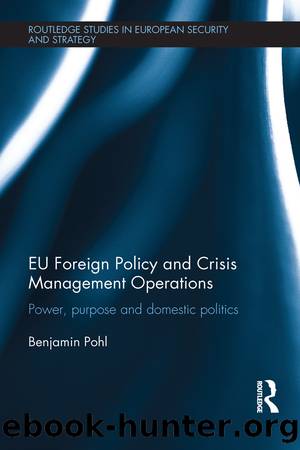EU Foreign Policy and Crisis Management Operations by Benjamin Pohl

Author:Benjamin Pohl [Pohl, Benjamin]
Language: eng
Format: epub
Tags: History, Europe, General, Political Science, Security (National & International), Peace, International Relations
ISBN: 9781134697083
Google: 3u4jAwAAQBAJ
Publisher: Routledge
Published: 2014-03-21T01:22:33+00:00
The German dilemma
The bitter struggle between France and Britain placed Germany in a pivotal position. Not only had it been the notional lead nation in building the Afghan police force, it was also gearing up to take over the EU Council presidency in the first half of 2007. Yet, according to several eyewitnesses, the initial German position in CivCom consisted of sitting on the fence (Interviews). As one non-German committee member put it,
the Germans didnât know what to say because the Foreign Office said yes, but the Ministry of the Interior said no. So, I was in a meeting and, depending on the day, the instructions from the German delegate in CivCom, what he said, was totally different, depending on where he got the instructions -until the Chancellorâs office decided, imposed that yes, we go the European way.
(Interview)
Berlin also perceived Anglo-Saxon criticism as a reason for changing tack -indeed, that criticism was shared by some German officials (Interviews). One official thus argued that the national police project had simply failed to evolve, still focusing on Kabul with the 40 police officers that it started with in 2002 -whereas by 2006 the NATO operation had massively expanded in numbers, geographical reach and approach, not least by setting up Provincial Reconstruction Teams throughout the country (Interview). While invoking US criticism, he presented the effort to Européanise the project as an attempt to fulfil rather than shirk German responsibility. Another German official emphasised public relation benefits: Europeanisation was not only supposed to bring in the additional resources critics called for, but also to deflect expected future blame from the German government to the EU (Interview).
Yet, in contrast to Paris and London, Berlinâs consideration of transatlantic relations came to be superseded by two domestic factors: first, the prospective Europeanisation triggered resentment within the German Mol since it was perceived as an indirect accusation that âtheirâ national project had failed (Interviews with German officials). This in turn made the government wary of embracing the mission at first. This reluctance however was counterbalanced by the domestic political need to emphasise the importance of civilian means for rebuilding Afghanistan, and the role that EUPOL Afghanistan could potentially play in demonstrating Germanyâs contribution in this respect.
Ultimately, the internal German tug-of-war was won by those in favour of Europeanising the German project. The overriding motive was likely the attempt to blunt transatlantic criticism of inadequate German contributions in Afghan-istan, which further built up in late 2006 around NATOâs Riga summit (Interviews with German officials; cf. F.A.S. 2006; Busse 2007a). The German government found itself in a dilemma: on the one hand, it felt the need to dispel the idea that Germany was âfree-ridingâ in Afghanistan where Berlin resisted sending soldiers to the (more dangerous) south (cf. F.A.S. 2006). On the other hand, in the face of societal and parliamentary disapproval over what was seen as an already overly militarised approach in Afghanistan, it could hardly acquiesce to US demands for greater engagement (cf. Kaim 2008; Harnisch 2010: 64â66). The
Download
This site does not store any files on its server. We only index and link to content provided by other sites. Please contact the content providers to delete copyright contents if any and email us, we'll remove relevant links or contents immediately.
The European Opportunity by Felipe Fernández-Armesto(570)
The European History Highway: A Guide to Internet Resources by Dennis A. Trinkle Scott A. Merriman(535)
Morgan Kaufmann Digital Watermarking and Steganography by Ingemar Cox Matthew Miller Jeffrey Bloom Jessica Fridrich Ton(529)
The Seven Wonders of the Ancient World by Michael Denis Higgins(521)
Hyperculture by Byung-Chul Han(510)
European Security without the Soviet Union by Stuart Croft Phil Williams(508)
European Security in a Global Context by Thierry Tardy(506)
The Routledge companion to Christian ethics by D. Stephen Long Rebekah L. Miles(499)
Get Real with Storytime by Julie Dietzel-Glair & Marianne Crandall Follis(444)
Hudud Al-'Alam 'The Regions of the World' - a Persian Geography 372 A.H. (982 AD) by V. V. Minorsky & C. E. Bosworth(438)
Tibetan Studies in Comparative Perspective by Chih-yu Shih Yu-Wen Chen(436)
Gorbachev And His Generals by William C. Green(429)
Governance, Growth and Global Leadership by Espen Moe(420)
How Languages Are Learned 5th Edition by Patsy M Lightbown;Nina Spada; & Nina Spada(408)
CliffsNotes on Fitzgerald's The Great Gatsby by Kate Maurer(400)
The Oxford History of the World by Fernández-Armesto Felipe;(388)
The Egyptian Economy, 1952-2000 by Khalid Ikram(386)
Oral Poetry and Narratives from Central Arabia: The Poetry of Ad-Dindan : A Bedouin Bard in Southern Najd (Studies in Arabic Literature, Vol 17) (English and Arabic Edition) by P. M. Kupershoek P. Marcel Kurpershoek(365)
The Oxford Handbook of the Incas by Sonia Alconini(365)
